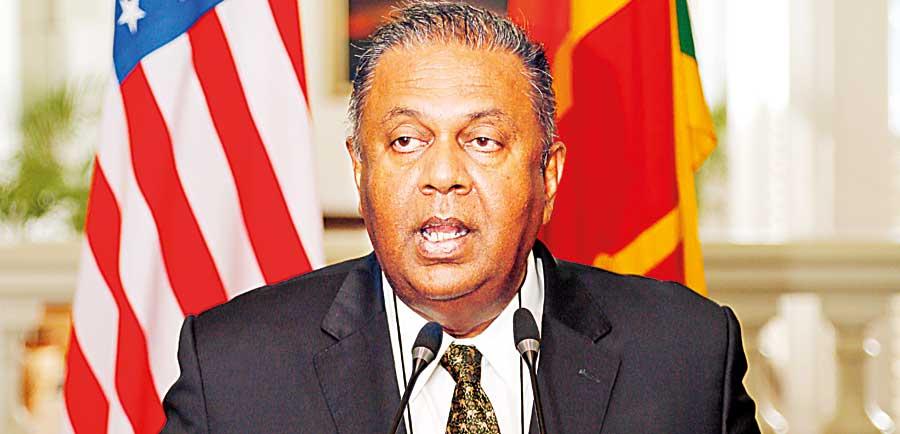24 Jul 2020 - {{hitsCtrl.values.hits}}

- Refuses to accept blame for Sajith’s Presidential defeat
- Feels not done enough for LGBT rights
- Disappointed with Sri Lankan politics
Former Foreign Minister and former Minister of Finance Mangala Samaraweera made a surprise decision not to contest the Parliamentary election.Various claims were made over his surprise move, including claims of a rift between him and Sajith Premadasa, who he had supported at the Presidential election. In an interview with Daily Mirror, Samaraweera explains the reason for his move, his future plans and more.
Excerpts of the interview
 Q One of the most unexpected and headline-making stories that came out ahead of the Parliamentary Elections was your decision not to contest at the election. Why did you take such a big step at such a crucial moment?
Q One of the most unexpected and headline-making stories that came out ahead of the Parliamentary Elections was your decision not to contest at the election. Why did you take such a big step at such a crucial moment?
This is something I have been thinking of ever since the presidential election were over. In fact, 31 years ago in 1989 when I first entered Parliament, I actually decided to come into politics because of the dreadful human rights situation at the time, especially in the deep south where I come from. And when I was invited by Mrs. Sirimavo Bandaranaike to become the organiser of the SLFP for Matara, I finally decided to take up the offer because I felt – I suppose when we’re young we all think we could change the world – that I could make a difference. And that’s why having entered Parliament in the general election of 1989, I along with Mahinda Rajapakse, started the Mothers’ Front movement at my own house in Walpola, Matara and we were both co-convenors of the movement. Later Richard De Zoysa’s mother Dr. Manorani Saravanamuttu became the Chief Patron and that is how I started my political journey, for what I believed in, especially human rights, freedom of expression, freedom of media and of course, most of all democracy. But sadly I felt after 30 odd years – in fact I celebrated my 30th year in politics last year in 2019 – I felt that we as a country have not really moved forward because the same issues that we were fighting for 30 years ago are still relevant today. We are still talking about preserving human rights, we are still talking about preserving democracy, and in fact I feel that democracy is more at stake than ever before, we are still talking of the freedom of expression, freedom of the media, etc. and I also felt rather restricted. After all these years, I felt the country hasn’t moved forward and I haven’t really moved forward, either, in many ways.
"I have done many elections before. I have never seen such a chaotic, unorganised election of that nature ever before and these views were not expressed by me just before that election"
Q But do you think you did enough while you were in office to actually make change?
Well, we did try to make certain changes, but certainly not enough. You see, the tragedy of Sri Lanka is, I sincerely believe, from the time we achieved independence, when Sri Lanka was actually perhaps one of the most democratic and developed countries in South Asia. I know that there was an editorial in the London Times, I was told, on the 4th of February, 1948, on the day of independence saying that Ceylon, which is going to be independent from Britain from that day, predicted a bright future for Sri Lanka, saying it was going to be the Switzerland of the East. And even if you read Lee Kuan Yew’s memoirs, he writes how Sri Lanka was considered the model commonwealth country at the time. At the time of independence, we had some of the best, the two best universities in Asia were here, we had a highly respected, highly regarded bureaucracy, we had police who are as good as any police force in the world. Sri Lanka  was really in the vanguard of nations in South Asia at the time, but today we along with the rest of them also must take part of the blame. Sri Lanka, the bright young kid in the class who was expected to do so well has basically trailed behind so much that now we are right at the back of the class in this part of the world. So as a result I have been personally thinking a lot, where did we go wrong. Of course it’s far too complex to say it in a few words, but I feel even though all our leaders who ruled our country from 1948 – from D. S. Senanayake to Gotabaya Rajapakse – they have all come to sit on that chair as the head of government and head of state, certainly with good intentions. I certainly don’t believe that any of our leaders came there with the sole intention of killing people, abducting people, stealing from the treasury or stealing from the country, or lying to the people. They all come with good intentions. But unfortunately, I feel that some of those who stay on the chair, the crown I feel was a little too heavy for them, like the recent experience we had, and some actually go berserk with the power and then they start imagining themselves as kings and they want to start sort of a monarchy in the country and even the very good leaders I felt never had the courage of their convictions to do what was right in the face of all the regressive forces, which always basically have tried to stop. I mean, the best example was when S.W.R.D. Bandaranaike who I feel was a man of impeccable integrity, but he has lot to answer for, because I feel the 1956 Revolutionis what unleashed all these retrogressive forces, the genie so to speak out of the bottle, and so many years later, we still haven’t been able to put that genie back in the bottle – the genie which brings extremism and regression, which has been our normal way of life. In 1957 had he signed the Chelvanayakam document, you know, history would have been different. He lost his nerve when a small group of Buddhist priests started to do a satyagraha in front of his house at Rosmead Place, he basically went out, tore the document in order to please them, but at the same time he realised what he was doing, because he is supposed to have said to the priests, even though I’m doing this because of your insistence, the country will feel the repercussions of my deed maybe in 30 to 40 years’ time. And just as he said, this ugly face of separation raised its head by the 70’s, by the 80’s. But we have to remember at the beginning, the Tamils of this country never asked for a separate state, it was only to do with the language, but we were unable to accommodate them even on that very simple request, quietly generation to generation they were pushed towards extremism. Finally, one of the most brutal terrorist organisations in the world was born on our soil. And we all have to be responsible for it. And what is worse is we have not learnt the lessons from that past experiences. In fact, Mahinda Rajapakse with all his flaws, I feel again had the best chance in 2009 once terrorism was defeated, when the LTTE was finally defeated, instead of going on an orgy of triumphalism trying to enact scenes from the Mahavansa, he actually could have used that moment to unite the country. If he used that moment to make a new Sri Lankan identity just after the war, he would have been remembered as the greatest of all leaders. But unfortunately he too fell into the trap of wanting to be a new Dutugemunu and he started this new journey towards majoritarianism which Gotabaya Rajapaksa has now taken a step further.
was really in the vanguard of nations in South Asia at the time, but today we along with the rest of them also must take part of the blame. Sri Lanka, the bright young kid in the class who was expected to do so well has basically trailed behind so much that now we are right at the back of the class in this part of the world. So as a result I have been personally thinking a lot, where did we go wrong. Of course it’s far too complex to say it in a few words, but I feel even though all our leaders who ruled our country from 1948 – from D. S. Senanayake to Gotabaya Rajapakse – they have all come to sit on that chair as the head of government and head of state, certainly with good intentions. I certainly don’t believe that any of our leaders came there with the sole intention of killing people, abducting people, stealing from the treasury or stealing from the country, or lying to the people. They all come with good intentions. But unfortunately, I feel that some of those who stay on the chair, the crown I feel was a little too heavy for them, like the recent experience we had, and some actually go berserk with the power and then they start imagining themselves as kings and they want to start sort of a monarchy in the country and even the very good leaders I felt never had the courage of their convictions to do what was right in the face of all the regressive forces, which always basically have tried to stop. I mean, the best example was when S.W.R.D. Bandaranaike who I feel was a man of impeccable integrity, but he has lot to answer for, because I feel the 1956 Revolutionis what unleashed all these retrogressive forces, the genie so to speak out of the bottle, and so many years later, we still haven’t been able to put that genie back in the bottle – the genie which brings extremism and regression, which has been our normal way of life. In 1957 had he signed the Chelvanayakam document, you know, history would have been different. He lost his nerve when a small group of Buddhist priests started to do a satyagraha in front of his house at Rosmead Place, he basically went out, tore the document in order to please them, but at the same time he realised what he was doing, because he is supposed to have said to the priests, even though I’m doing this because of your insistence, the country will feel the repercussions of my deed maybe in 30 to 40 years’ time. And just as he said, this ugly face of separation raised its head by the 70’s, by the 80’s. But we have to remember at the beginning, the Tamils of this country never asked for a separate state, it was only to do with the language, but we were unable to accommodate them even on that very simple request, quietly generation to generation they were pushed towards extremism. Finally, one of the most brutal terrorist organisations in the world was born on our soil. And we all have to be responsible for it. And what is worse is we have not learnt the lessons from that past experiences. In fact, Mahinda Rajapakse with all his flaws, I feel again had the best chance in 2009 once terrorism was defeated, when the LTTE was finally defeated, instead of going on an orgy of triumphalism trying to enact scenes from the Mahavansa, he actually could have used that moment to unite the country. If he used that moment to make a new Sri Lankan identity just after the war, he would have been remembered as the greatest of all leaders. But unfortunately he too fell into the trap of wanting to be a new Dutugemunu and he started this new journey towards majoritarianism which Gotabaya Rajapaksa has now taken a step further.
"We did try to make certain changes, but certainly not enough. You see, the tragedy of Sri Lanka is, I sincerely believe, from the time we achieved independence, when Sri Lanka was actually perhaps one of the most democratic and developed countries in South Asia"
Q Do you think that the opinions you had expressed, prior to the presidential election when Sajith Premadasa was also going to contest, were not taken well and that probably cost Sajith Premadasa the election as well?
No, I don’t think that is the reason which cost him the election because the election itself was chaotic and unorganised. I have done many elections before. I have never seen such a  chaotic, unorganised election of that nature ever before and these views were not expressed by me just before that election. In fact these are the views I have been expressing ever since I came into politics. It’s nothing against Buddhism, but in this age of patriotism, I consider myself a true patriot; not these ones who use patriotism as a sort of a badge on their sleeve to hide all their other sins. felt finally that I need to be more flexible because as you rightly say there were especially in the UNP and the SJB also, many people who felt rather uncomfortable with my views, and I thought to myself even I’m more uncomfortable with their views, so this might be the moment where I should leave parliamentary politics and be with like-minded people and fight for the values I believe in. I can be doing much better even outside, and in the last months or so when I have been liberated from the need to do parliamentary politics I think I’ve started a more interesting journey than before.
chaotic, unorganised election of that nature ever before and these views were not expressed by me just before that election. In fact these are the views I have been expressing ever since I came into politics. It’s nothing against Buddhism, but in this age of patriotism, I consider myself a true patriot; not these ones who use patriotism as a sort of a badge on their sleeve to hide all their other sins. felt finally that I need to be more flexible because as you rightly say there were especially in the UNP and the SJB also, many people who felt rather uncomfortable with my views, and I thought to myself even I’m more uncomfortable with their views, so this might be the moment where I should leave parliamentary politics and be with like-minded people and fight for the values I believe in. I can be doing much better even outside, and in the last months or so when I have been liberated from the need to do parliamentary politics I think I’ve started a more interesting journey than before.
Q Some are saying that you are probably looking at a role, beyond Sri Lanka, maybe at the UN?
I have been invited to do some lectures at Harvard by a very good friend of mine in America and all that. But no. My life is in Sri Lanka. I love Sri Lanka. In fact, as a student I stayed for 10 years in the UK. I could have easily got Permanent Residency there, but even at that age, I wanted to go back to Sri Lanka and I don’t regret that decision, especially now at 64, I certainly am not going anywhere. I will stick it out and I think Sri Lanka needs the values I believe in more than ever before.
Q With the current Parliament, do you think there is someone out there who can actually bring the sort of change that you are expecting?
The only person who can perhaps even understand or even have a certain conception of the values that I’m talking about is Ranil Wickremesinghe. I have a great deal of respect for him. But on the other hand he is not a populist politician, unfortunately for the country. In fact, I always believe that Ranil Wickremesinghe – I hope I’m wrong, there’s still time – will always be remembered as the best president Sri Lanka never had. But beyond that I feel we don’t have to have people in Parliament as long as there are people within this country, especially the youth. I think it’s finally their country, and they are the ones who have to live here for the next 50 or 60 years, all the mistakes that we do today, they are the ones who will live through it and I’m beginning to feel there is the new ‘X’ generations, the ‘Y’ generations, the ‘Z’ generations, all these new terms there are, they’re becoming far more enlightened and far more forward than we are.
Q You’re talking about Ranil Wickremesinghe, but you supported Sajith Premadasa.
Sajith was actually an extremely good minister. In fact as Finance Minister he was one of the few ministers to whom I allocate certain funds without any fear because I knew the money would be put to good use efficiently. There is a lot of waste in some of the other ministries. He was an excellent minister and of course he was also the popular face of the party and that was one of the reasons I really fought for his candidacy at the presidential election, because I really wanted to defeat or at least stop the recurring of the Rajapaksa regime at any cost.
Q Isn’t that the biggest issue where people are going for populists as opposed to capable leaders?
Exactly. I suppose it’s not only a problem with this country, but populism is becoming the bane of many a democracy. Right at this moment, look at what’s happening in the United States,  look at what’s happening in Romania, to what’s happening in Brazil. You know all these populist leaders are being swept into power without thinking of the consequences that will follow. But in Sri Lanka perhaps providence is doing that within seven months. All those people who voted for the change are beginning to realise what a dreadful mistake they had made. And I believe after the elections, after the 5th of August, the true nature of this government, people will be able to see. And that is when I think a very strong movement to protect our democracy from militarisation and also a new dangerous trend is also taking place where you have the executive basically completely ignoring the legislature that is the Parliament.
look at what’s happening in Romania, to what’s happening in Brazil. You know all these populist leaders are being swept into power without thinking of the consequences that will follow. But in Sri Lanka perhaps providence is doing that within seven months. All those people who voted for the change are beginning to realise what a dreadful mistake they had made. And I believe after the elections, after the 5th of August, the true nature of this government, people will be able to see. And that is when I think a very strong movement to protect our democracy from militarisation and also a new dangerous trend is also taking place where you have the executive basically completely ignoring the legislature that is the Parliament.
Q You have worked with the likes of Mahinda Rajapaksa, Ranil Wickremesinghe, Maithripala Sirisena and so on. Do you have any regrets looking back at your time in office, about more you could have done with these leaders or maybe they just didn’t give you the space to do that?
Of course I must say that during Chandrika Kumaratunga’s administration I was given the most space and it was during that period I did the most amount of work for the country, starting from the privatisation of telecom to starting the Colombo redevelopment plan and all that. The opportunity came during that time. But ever since I regret not being able to do more with some of the other leaders, because as I say, their agenda was hi-jacked by extremists in some of the other places along the way.
"During Chandrika Kumaratunga’s administration I was given the most space and it was during that period I did the most amount of work for the country, starting from the privatisation of telecom to starting the Colombo redevelopment plan and all that"
Q Another area you openly spoke on was LGBT rights. This is a sensitive issue and often took a backseat. Do you think Sri Lanka will ever recognise LGBT rights?
We have to. In fact, I feel I haven’t spoken enough about LGBT rights. Perhaps from the sort of background that most of us come from Colombo, LGBT issues were never an issue. It was basically accepted by your families, your friends, by your teachers, etc.
Q That was included in the national action plan, wasn’t it?
It was, in fact that was included in the national action plan, because we are still, as far as LGBT rights, especially gay rights are concerned, governed by one of the most archaic laws. It is from the time of Queen Victoria. Then of course, Queen Victoria’s own country has moved forward away from it and today we are still protecting Queen Victoria’s law saying it is part of the Sinhala Buddhist culture, which is an absolute joke. I mean, two consenting adults having the right to love each other is their private business and nothing to do with the state or the government.
Q Talk us through Sri Lanka’s foreign policy. When you were foreign minister, you took an independent stand. Now we see a bit of confrontation taking place with the US and India. Is Sri Lanka’s foreign policy on the right track?
It is disastrous. Sri Lanka is again rapidly hurling towards confrontation and international isolation. In fact over the years especially in 2015, Sri Lanka opened itself up to the world and we established excellent relations with all the different power blocks. I mean we had excellent relations with the United States; the secretary of state John Kerry - the first visit by such a high officer in 44 years – was here. Samantha Power, the US ambassador to UN was here several times. And in fact even President Obama who used to call us the good news country at that time, because in a world full of conflict Sri Lanka was the country he was getting good news about all the reform and all the changes and in its democratisation, and in his last trip to Asia in 2016 to Vietnam, he finally agreed to come to Colombo, the first ever state visit it would have been by the US president, in May of that year. But the day he could actually allocate was the very day we were celebrating Vesak here. President Sirisena was quite excited and said no no no, bring him, we can go and see the pandals together, but the American President had more things in mind, like a joint address to Parliament, so finally that was taken off his itinerary. So likewise, with the whole world, we were welcome by President Putin in Moscow, by China, we had a very close relationship with the EU.
Q But some say you distanced yourself with China.
Not at all. We didn’t want to only deal with China. We wanted a balanced foreign policy, where we would open ourselves to the whole world.
Q Wasn’t there too much interference from the US?
Why should the US?
"Sri Lanka is again rapidly hurling towards confrontation and international isolation. In fact over the years especially in 2015, Sri Lanka opened itself up to the world and we established excellent relations with all the different power blocks"
Q Because they were at the Human Rights Council?
The Human Rights Council is another story. I don’t know if you have time enough to talk about it, but what people don’t know is that President Rajapaksa himself committed Sri Lanka to an international investigation when Ban Ki-Moon arrived here two days after the war ended. There was a joint agreement and subsequently in Geneva, the Sri Lankan government agreed to do certain reconciliation to deal with the issues. But as always they were mere lies to get over the problem for the moment. And finally Geneva, it had nothing to do with the US alone; the European Union and the whole of the UNHRC decided and initiated an international investigation against Sri Lanka without Sri Lanka’s participation and that report was to have been tabled in Geneva in March of 2015. In fact had that report been tabled, that final report, it’s a damning report, in fact most probably after that report had been tabled there would have been further economic sanctions on Sri Lanka, definitely there would have been travel bans on President Rajapaksa and other members of his family and other key members of the administration but luckily for Mahinda and others and luckily for Sri Lanka, the government changed on the 8th of January. In fact, as foreign minister after visiting India, the next visit I did was I immediately went to Geneva, and Zeid was the chief there, and we had a long discussion with him. We insisted that this international investigation that was being done without Sri Lanka’s participation be taken off the book and we said now there is a new government, we can actually guarantee the independence of the judiciary now, so please we will do an investigation to any of the allegations of war crimes and others within Sri Lanka by ourselves. That was a huge victory and not only did we persuade the UNHRC, we persuaded the United States of America, we persuaded the United Kingdom, we persuaded countries like Germany to co-sponsor that resolution, which brought the investigation back into Sri Lankan hands.
10 Jan 2025 7 minute ago
10 Jan 2025 14 minute ago
10 Jan 2025 30 minute ago
10 Jan 2025 45 minute ago
10 Jan 2025 50 minute ago